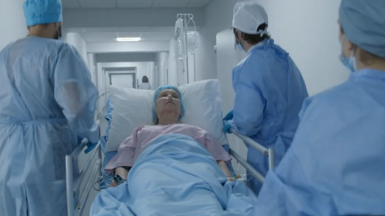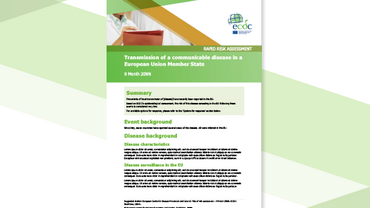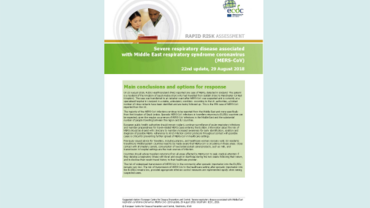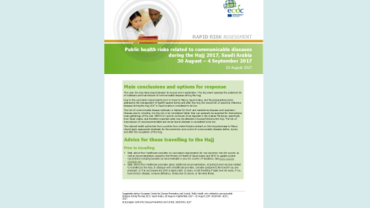Severe respiratory disease associated with Middle East respiratory syndrome coronavirus - 21st update, 21 October 2015
This 21st update of ECDC’s risk assessment on MERS-CoV has been triggered by an increase in MERS cases acquired through nosocomial transmission in Amman, Jordan. In this update, we assess whether this event changes the risk of international spread or increases the risk to EU citizens living in or travelling to Jordan.
Executive Summary
The most recent Middle East respiratory syndrome (MERS) outbreak in Jordan is not unexpected although is of concern, concludes an updated rapid risk assessment.
Given the continuous occurrence of MERS cases in the Middle East and the substantial number of people travelling between the region and EU countries, sporadic importation of MERS cases to EU/EEA Member States can be expected. The majority of the MERS cases continue to be reported from the Middle East. A total of 15 cases have been reported in Europe, the last in Germany in March 2015.
The majority of the reported cases in the current outbreak in Jordan have an exposure history involving a hospital with an admitted confirmed MERS case. The role of hospitals as amplifiers of MERS-CoV infection is now well known. The risk of importation of cases to EU/EEA Member States from Jordan is considered low.
Those travelling to Middle Eastern countries should be made aware that MERS-CoV is currently circulating in the region, and that transmission in hospital settings is still one of the main sources of infection. EU citizens should also be reminded that the risk of infection can be reduced by taking simple infection prevention measures.
The World Health Organization does not recommend travel restrictions in relation to MERS-CoV.
Should someone infected with MERS-CoV enter Europe, they are likely to present themselves to a healthcare facility. The risk of nosocomial spread highlights the need for awareness among healthcare workers, stringent infection control precautions, early detection through functioning testing algorithms and preparedness planning.
The risk of widespread transmission of MERS-CoV in the community after sporadic importation into the EU/EEA remains low.
Previously issued advice for travellers, including pilgrims, and healthcare workers remains valid.







